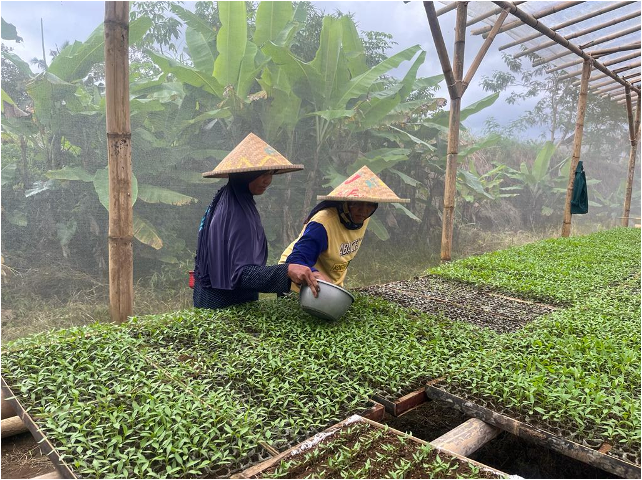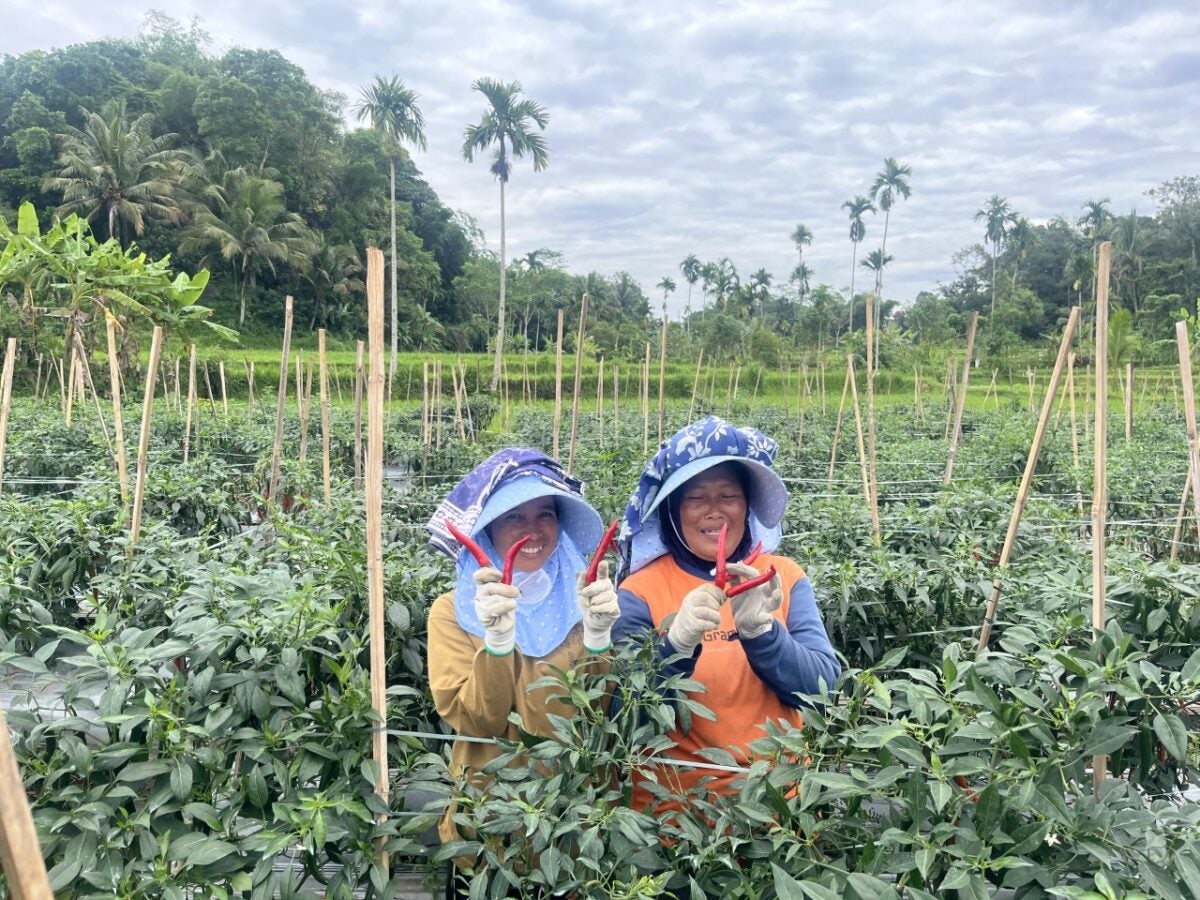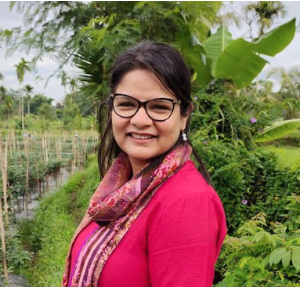By Anvesha Punjani, Monitoring and Evaluation Specialist at Good Return.
Chilli is one of the most important ingredients of Indonesian cuisine, and demand in the crop grows every year in line with increasing population and industrial need. At least half a million households grow chilli in Indonesia, with over 50% coming from Java.
In a recent evaluation visit to the Tasikmalaya region, financial inclusion agency Good Return interviewed farmers and confirmed the findings of academic reports: that there are many challenges with the cultivation of chilli crops. Difficulty in accessing capital and increasing productivity through efficient use of fertilisers and pesticides is front of mind for many farmers. Once a crop is in place, the chilli sapling is vulnerable to pest attacks and changes in climate. Once harvested, chilli has a short shelf life.
Good Return and local partner CROWDE are striving to tackle each of these obstacles strategically and make the chilli industry more viable for farmers, particularly women. Their Impact Investment Fund raises capital to assist rural entrepreneurs with labour hire and inputs – 83% of the loans go to women, and they also focus on businesses that employ other women. The broader investment program also uses CROWDE’s innovative farming expertise to help farmers overcome technical issues. Here are three projects changing the way rural communities are farming chilli.
Protecting seedlings
CROWDE has built three nurseries for raising seedlings for planting purposes in West Java. The nurseries are designed to suit the local climate, so the two structures in Tasikmalaya and Bogor have higher ceilings than the third structure in Sukabumi, where it is cooler. The closed-system nurseries protect the seedlings from climate factors such as rain and excessive sunlight and against unwanted pests and pathogens. After growing for 14 days, the seedlings are taken by CROWDE’s loan recipients for planting on their own land. This reduces the chances of crop failure tremendously at the early age of plantation. The nurseries also support local employment – there are 4 full time employees and 10 part time hired during plantation season in the Tasikmalaya nursery.
Building technical skills for all 
Women make a huge contribution to chilli farming in West Java, but lack formal inclusion and access to training. CROWDE has helped to facilitate ‘gender hubs’ – physical spaces in local villages where women can gather together and share knowledge on farming practices. The hubs are also used to build other skills, such as turning farming waste into woven products like baskets, or simply as a positive place for women to gather. Farmers – both men and women – are also regularly visited by field agents, who provide technical assistance, consultation and information. Good Return has worked closely with CROWDE staff to build their gender inclusion practices, so they are understanding of the different needs and contexts of working with women business owners.
Making the most of the harvest
Fresh chillies have a shelf-life of just three or four days after harvest and there is pressure on farmers to transport their yield quickly to buyers. CROWDE facilitates storage and selling for its clients, by negotiating a price for the chilli as part of the client’s loan repayment. As soon as the crop is harvested, the farmer can bring the product straight to the CROWDE storage facility where it is sorted and ‘bought back’.
Farming innovative practices have been taken further with a new solar drying dome. Traditionally smallholder farmers dry their crops by the roadside, leading to contamination and a product loss of 30-50%. The dryer dome’s parabolic shape enables solar radiation, and allows rainwater to run off easily. Polycarbonate sheets used to cover the dome create a greenhouse effect as it is coated with a UV protection layer. Reducing UV exposure results in higher valued final products as agricultural produce keeps its vibrant colour and valuable nutrient values. The dryer also mitigates hygiene risks caused by livestock animals, dust, or water contamination.
These examples show a combination of innovation, skill building and access to responsible capital is an effective mix in building sustainable and inclusive growth in Indonesia’s chilli sector. As opportunity grows, more people will benefit from stable incomes, economic security and generational change.

This piece is based on the literature review and visit of the Good Return team in late 2022, which allowed for on-the-ground interactions with staff of CROWDE and farmer clients in Indonesia.
About the Author
Anvesha has been working for more than 15 years in the development sector. She is  particularly interested in research, designing and implementation of monitoring and evaluation frameworks that create evidence for future project designs and conducting evaluation studies. She is proficient in both qualitative and quantitative research. Anvesha has worked on number of projects with India, UK and US based organisation on health, education, microfinance and arts. She has worked extensively in India and Cambodia in both urban and rural areas.
particularly interested in research, designing and implementation of monitoring and evaluation frameworks that create evidence for future project designs and conducting evaluation studies. She is proficient in both qualitative and quantitative research. Anvesha has worked on number of projects with India, UK and US based organisation on health, education, microfinance and arts. She has worked extensively in India and Cambodia in both urban and rural areas.
References
- M T Sundari et al 2021 IOP Conf. Ser.: Earth Environ. Sci. 905 012046 https://iopscience.iop.org/article/10.1088/1755-1315/905/1/012046/pdf
- https://ei-ado.aciar.gov.au/sites/default/files/docs/chilli_executive_summary_final.pdf
- https://digital.library.adelaide.edu.au/dspace/bitstream/2440/124081/1/Sayekti2019_PhD.pdf
- Doss, C, Meinzen-Dick, R, Quisumbing, A & Theis, S 2018, ‘Women in agriculture: Four myths’, Global Food Security, vol. 16, pp. 69-74.https://www.sciencedirect.com/science/article/pii/S2211912417300779
- Indonesian Vegetables Research Institute, Lembang-Bandung, Indonesia, et al. “Farmers’ challenges on chilli farming in the acid dry land : A case study from Pasir Madang-Bogor Regency, Indonesia.” E3S Web of Conferences, vol. Volume 316, 2021, 2021. https:/e3s-conferences.org/articles/e3sconf/abs/2021/92/e3sconf_iconard2021_03010/e3sconf_iconard2021_03010.html.
- Indonesian Vegetables Research Institute, Lembang-Bandung, Indonesia, et al. “Farmers’ challenges on chilli farming in the acid dry land : A case study from Pasir Madang-Bogor Regency, Indonesia.” E3S Web of Conferences, vol. Volume 316, 2021, https://www.e3s-conferences.org/articles/e3sconf/abs/2021/92/e3sconf_iconard2021_03010/e3sconf_iconard2021_03010.html
